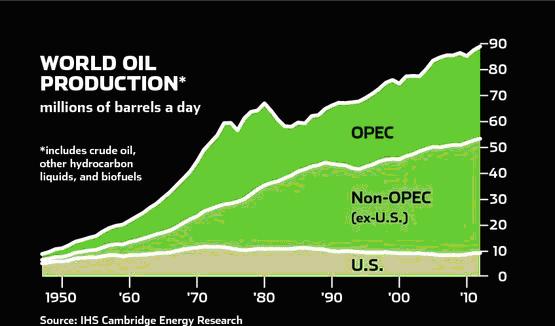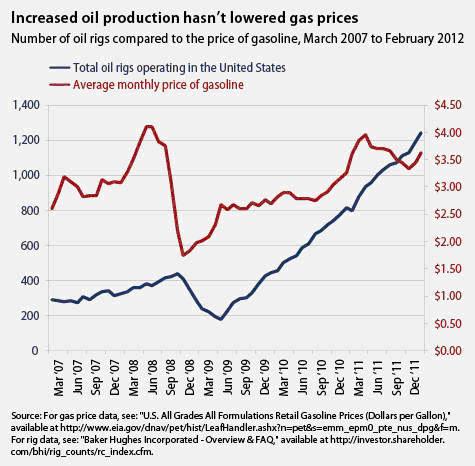Newt Gingrich, Mitt Romney, Rick Santorum and Republican Congressional leaders like John Boehner have decided that high gas prices are the key to their defense against President Obama and the Democrats -- and they have decided that building the Keystone XL Pipeline is the symbol of their commitment to bringing down gas prices through "drill, baby drill" strategies.
Gingrich, in particular, following in Michelle Bachmann's earlier unsuccessful shoes, has pledged that if he is elected, gas prices will be reduced to $2 or $2.50 gallon. Were this to happen, however, no one would be more unhappy than TransCanada, the builder of the Keystone Pipeline. Because at $2 gallon, there is simply no market for its product -- tar sands oil is only profitable when crude oil prices are above $70 barrel. To get gasoline down to $2, crude must fall below $50 -- meaning an empty Keystone Pipeline.
Gingrich also ignores the fact that building the Keystone, by enabling tar sands crude to be exported from the U.S. to higher price gasoline markets in Europe, would actually increase the price of oil in the American Midwest.
How does Newt propose to deliver on his promise? Well, the first thing he promises is to increase the amount of oil the U.S. needs -- by eliminating fuel economy standards, so that Americans can once again be forced to purchase cars they cannot afford to drive. So far, Newt's proposals make us worse off.
Then he wants to open up places like the Arctic Wildlife Refuge to drilling -- unfortunately, the cost of extreme oil from places like the Arctic, once again, is above the $70/b mark, not the $50 Newt needs in his $2/gallon pipe-dream. None of these numbers stop Newt from claiming that, somehow, the U.S. can simply produce enough oil on its own to bring down the price of oil. No serious oil industry figure has stepped forward to validate this craziness. And if you want to see just how implausible it is, look at the following charts:
The first chart shows U.S. oil production relative to world output. Relative to our reserves, we are batting above our league -- we have less than 3 percent of the world's reserves, but produce 7 percent of the world's oil.

But even a significant increase in U.S. oil production would not make a meaningful dent in the global supply and demand equation -- we are simply too small a part of the total.
The second chart shows what has happened to U.S. oil prices and drilling activity; it shows that as U.S. oil prices rise, so do the number of wells being drilled -- but more wells do not equal lower prices.

So the Drilling crowd's plans -- consume more oil by letting car companies produce more wasteful vehicles, and rely on both U.S. and imported extreme, dirty oil sources to drive down gas prices -- is pure fantasy. Extreme oil plays like the tar sands and remote Arctic require EXPENSIVE, not CHEAP gas.
There is of, course, always the possibility of magic. This seems to be what some of Newt's supporters are counting on.
Texas Governor and former Presidential candidate Rick Perry, for example, commented:
As a matter of fact, perception is everything in this world we live in, and if the perception is Newt Gingrich could be the next president of the United States, that will have a worldwide effect, I will suggest to you, on the price of oil.
This absurdity is remiscent of the comments by some Bush administration staffers that "Empires make their own reality." But if Newt Gingrich is really Harry Potter in disguise, one imagines he might have dispatched Mitt Romney by now -- Harry certainly would have!
What is the public making of this? Thus far the pattern is quite different than during the oil price spikes of the Bush administration. During that period the public was angrier at both the president and the oil companies -- 25 percent blamed Bush, only 18 percent blame Obama, and the oil company share is down from 31 percent to 14 percent. Far more people haven't made up their mind yet. And most of those who blame Obama are Republicans, so there is no evidence that the Gingrich/Boehner attacks are gaining meaningful traction.
Fox News and the Republicans have now taken to misquoting Energy Secretary Steve Chu has having actually coming out in favor of higher gas prices -- which the record shows never happened. Fox's attack shows that the network seems to be suffering from some form of memory loss, since back in 2008 it defended the Bush administration by arguing that "no President has the power to increase or to lower gas prices."
In the short term, of course, that is true. In the longer term, the numbers make it very clear that a U.S. President can influence the costs of gasoline -- not by magically enhancing domestic supply, but by using innovation and efficiency to reduce U.S. -- and therefore world -- demand. Modest reductions in global DEMAND for oil translate into large savings on the COST of oil -- precisely because if the world doesn't need $80/barrel tar sands oil, prices for the conventional, low-cost sources of oil fall, and fall rapidly.
So the next time you hear a presidential candidate talk about the cost of driving, make sure that he understands the ground rules of making it cheap:
- Don't waste. A 50 percent improvement in fuel efficiency for vehicles equals BOTH less fuel and cheaper fuel -- it's the equivalent, at least, of cutting the price of gas from $4.00 to $2.00, Newt's stated goal.
- No extreme oil allowed. No tar sands, no remote Arctic, no ultra-deep ocean -- these simply cost too much.
- Find alternatives to oil for liquid fuels. Bio-fuels or vehicle electrification are already cheaper than80 oil, and by driving down demand, also reduced the price/barrel.
A veteran leader in the environmental movement, Carl Pope is the former executive director and chairman of the Sierra Club. Mr. Pope is co-author -- along with Paul Rauber -- of Strategic Ignorance: Why the Bush Administration Is Recklessly Destroying a Century of Environmental Progress, which the New York Review of Books called "a splendidly fierce book."